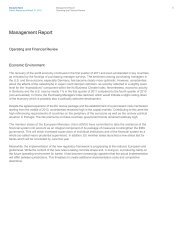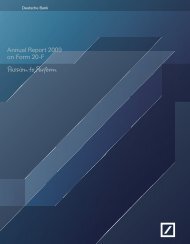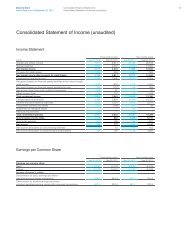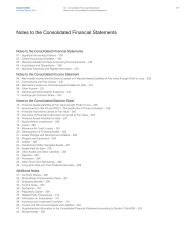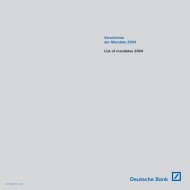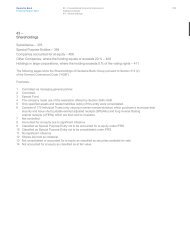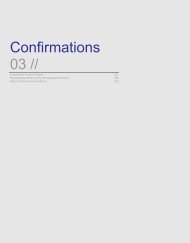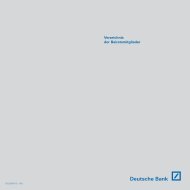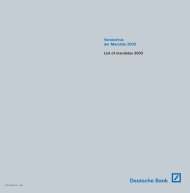SEC Form 20-F - Deutsche Bank Annual Report 2012
SEC Form 20-F - Deutsche Bank Annual Report 2012
SEC Form 20-F - Deutsche Bank Annual Report 2012
Create successful ePaper yourself
Turn your PDF publications into a flip-book with our unique Google optimized e-Paper software.
<strong>Deutsche</strong> <strong>Bank</strong><br />
<strong>Annual</strong> <strong>Report</strong> <strong>20</strong>10 on <strong>Form</strong> <strong>20</strong>-F<br />
Item 4: Information on the Company 44<br />
On November 24, <strong>20</strong>10, the European Union enacted regulations to further integrate the existing national<br />
supervisory authorities into a European System of Financial Supervision. A European Systemic Risk Board<br />
(ESRB) was established and the independent advisory committees to the European Commission for banks,<br />
insurance companies and securities markets which had existed since <strong>20</strong>04 were transformed into new European<br />
authorities: the European <strong>Bank</strong>ing Authority (EBA), the European Insurance and Occupational Pensions<br />
Authority (EIOPA) and the European Securities and Markets Authority (ESMA).<br />
The ESRB is responsible for the macro-prudential oversight of the financial system within the EU. It will in<br />
particular collect and analyze all relevant information, identify systemic risks, issue warnings and recommendations<br />
for remedial action as appropriate. The secretariat of the ESRB is provided by the European Central <strong>Bank</strong>.<br />
The tasks of EBA and the other new authorities are to further integrate and harmonize the work of the relevant<br />
national supervisory authorities and to ensure a consistent application of EU law. To that effect they shall in<br />
particular develop technical standards for supervision which will become effective if the European Commission<br />
endorses them. They shall also issue guidelines and recommendations for supervisory practices and coordinate<br />
the work of national authorities in emergency situations where the orderly functioning or integrity of the financial<br />
markets or the stability of the financial system in the EU is jeopardized. In such case, the EBA and the other<br />
new authorities may give instructions to national authorities and, in certain circumstances, directly to banks and<br />
other financial institutions, to take remedial measures.<br />
Regulation and Supervision in the United States<br />
Our operations are subject to extensive federal and state banking and securities regulation and supervision in the<br />
United States. We engage in U.S. banking activities directly through our New York branch. We also control U.S.<br />
banking subsidiaries, including <strong>Deutsche</strong> <strong>Bank</strong> Trust Company Americas (“DBTCA”), and U.S. broker-dealers,<br />
such as <strong>Deutsche</strong> <strong>Bank</strong> Securities Inc., U.S. nondeposit trust companies and nonbanking subsidiaries.<br />
On July 21, <strong>20</strong>10, the United States enacted the Dodd-Frank Wall Street Reform and Consumer Protection Act<br />
(Dodd-Frank), which provides a broad framework for significant regulatory changes that will extend to almost<br />
every area of U.S. financial regulation. Implementation of Dodd-Frank will require further detailed rulemaking over<br />
several years by different U.S. regulators, including the Department of the Treasury, the Federal Reserve Board,<br />
the Securities and Exchange Commission (<strong>SEC</strong>), the Federal Deposit Insurance Corporation (FDIC), the Commodity<br />
Futures Trading Commission (CFTC) and the newly created Financial Stability Oversight Council (Council), and<br />
uncertainty remains about the final details, timing and impact of the rules.<br />
Among other things, Dodd-Frank will limit the ability of banking entities to sponsor or invest in private equity or<br />
hedge funds or to engage in certain types of proprietary trading in the United States unrelated to serving clients,<br />
although certain non-U.S. banking organizations, such as <strong>Deutsche</strong> <strong>Bank</strong>, will be able to engage in such activities<br />
solely outside the United States. Dodd-Frank also provides regulators with tools to provide greater capital, leverage<br />
and liquidity requirements and other prudential standards, particularly for financial institutions that pose significant<br />
systemic risk. However, in imposing heightened capital, leverage, liquidity and other prudential standards on non-<br />
U.S. banks such as <strong>Deutsche</strong> <strong>Bank</strong>, the Federal Reserve Board is directed to take into account the principle of<br />
national treatment and equality of competitive opportunity, and the extent to which the foreign bank is subject to<br />
comparable home country standards.<br />
U.S. regulators will also be able to restrict the size and growth of systemically significant non-bank financial companies<br />
and large interconnected bank holding companies and will be required to impose bright-line debt-to-equity<br />
ratio limits on financial companies that the Council determines pose a grave threat to financial stability. Furthermore,<br />
Dodd-Frank provides for an extensive framework for the regulation of over-the-counter (OTC) derivatives,<br />
including mandatory clearing, exchange trading and transaction reporting of certain OTC derivatives, as well as





